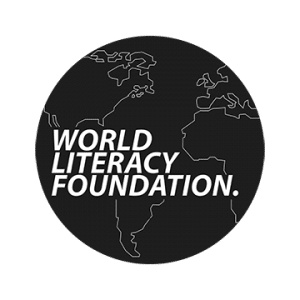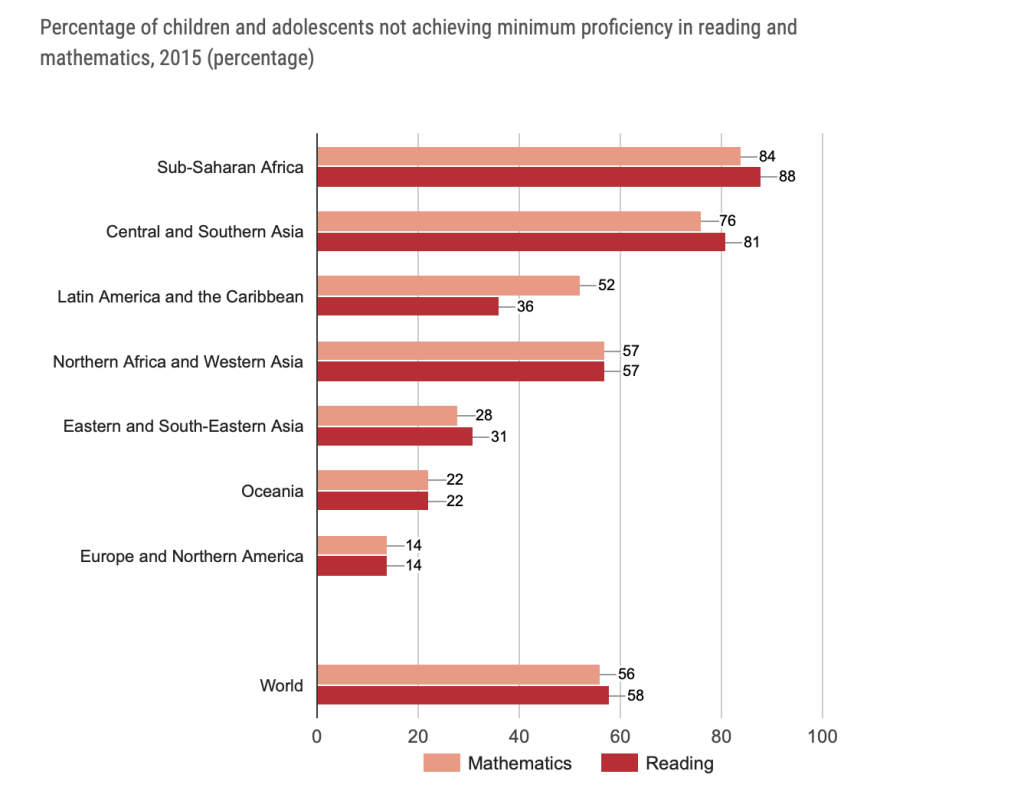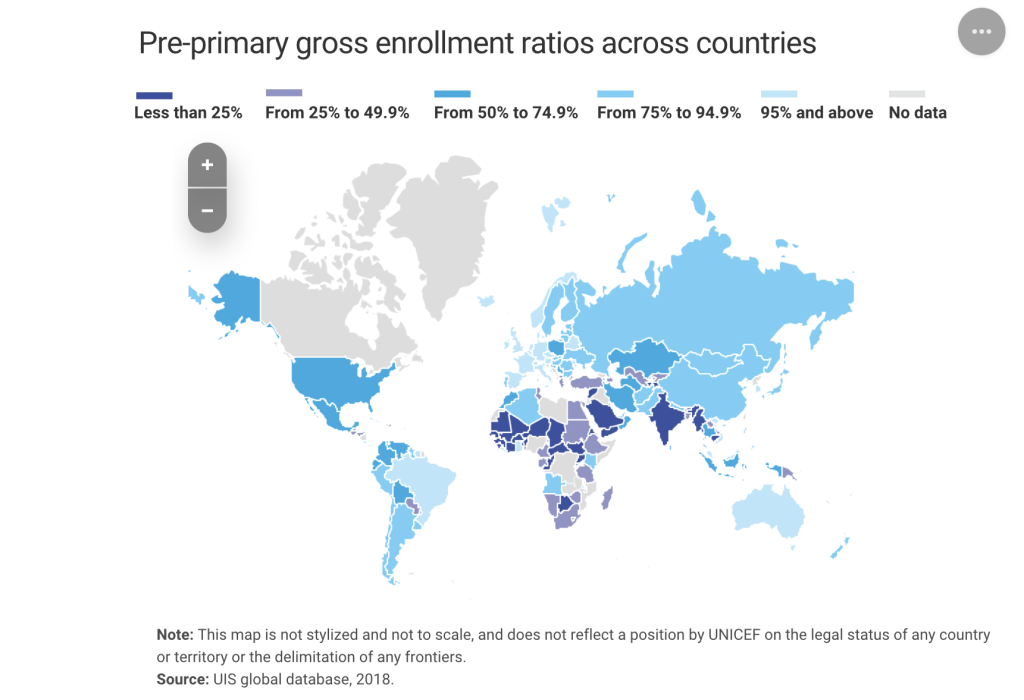Home » Posts tagged 'Literacy'
Tag Archives: Literacy
Free Access to Education for All Through Literacy

Literacy is a huge problem throughout the world, especially in developing countries such as Latin America. According to the Economic Commission for Latin America and the Caribbean, about “9% of individuals ages 15 and older are illiterate which equates to about 38 million” (cepal.org) illiterate individuals in Latin America and the Caribbean. A majority of these individuals are women who make up about 20 million of the 38 million in Latin America and the Caribbean. Literacy is such an important part of education to end the cycle of poverty as well as contribute to an increase in the country’s economy by having more job opportunities for individuals to seek higher paying jobs. According to the United Nations Social Development Goals, Goal 4: Quality Education is set to “ensure inclusive equitable quality education and promote lifelong learning opportunities for all” (SDG Indicators). Below are the percentages of children and adolescents who are not achieving minimum proficiency in math or reading in 2015:

According to the World Literacy Foundation, the impact of illiteracy in a country can cost a country’s global economy an estimated 1.9 trillion dollars annually, as well as increase the amount of unemployment in a country if individuals do not have proper literacy skills that employers need which can cause vacancies in these industries. One social impact of illiteracy is that it can negatively affect the importance of education which can continue the cycle of poverty through generations.
The second social impact of illiteracy is poor health outcomes, welfare dependency, gender inequality, and lack of social skills for women and men. There are currently 5.5 million more girls than boys that are out of school worldwide and that number will most likely increase. The health impact of illiteracy can impact a child’s health and survival due to the mother’s lack of understanding of health education and behaviors. Illiteracy can impact an individual’s ability to understand health information, read medication labels, and make accurate decisions on the health of themselves and their families.
The World Literacy Foundation is “a global nonprofit organization striving to ensure that every child regardless of geographic location has the opportunity to acquire literacy skills and books to reach their full potential to succeed in school and beyond” (World Literacy Foundation.org). The World Literacy Foundation was established in 2003 in Melbourne, Australia to bring books, tutoring, and literacy resources to children without any support” (The World Literacy Foundation.org). They expanded to other countries around the world to combat illiteracy.
The World Literacy Foundation’s impact on the Aprende Leyendo program in Manizales, Columbia, and the impact in 2022 globally has been outstanding. In 2020 through the Aprende Leyendo program, “940+ children and parents accessed services through the World Literacy Foundation, 1,170+ free books, and literacy packs were distributed, 60+ reading sessions were facilitated, 450 volunteers hours were donated to the foundation’s projects as well as 150+ eBooks and digital activities were created for the Dingo App which allows access to digital books in English and Spanish for students with poor internet connection in rural communities” (Aprende Leyendo, World Literacy Foundation). For 2022, “Globally 91% of children who used World Literacy Foundation services showed improvements in their literacy skills. 78% of children who received books and reading support through their services showed positive changes toward healthy reading habits. They distributed 180,000 books as well as providing 8,400 hours of literacy support. They also produced 341 local language and bilingual books in 31 different languages as well as reach 180 million people with information about the importance of reading and awareness of literacy in their communities. Every 3 seconds in 2022, a child or young person used one of the World Literacy Foundation’s educational resources or services. Lastly, they provided literacy intervention in 54 countries including Columbia reaching 840,000 children through their Youth Ambassadors program and literacy partners” (World Literacy Foundation Impact Report 2022) which include Noble Projects Literacy Candle Company, Atmosphere Press Company, Pitney Bowes technology company, Pura Vida bracelets company, Vizrt software company, Harry Moon book series, Mr. Wordsmith stationary products in Melbourne, Australia, and Fable online books company (World Literacy Foundation.org).
The World Literacy Foundation has set Millennium Development Goals in 2000 to ensure that “by 2015, children everywhere will complete a full course of primary schooling and to eliminate gender disparity in primary and secondary education by 2005 and in all levels no later than 2015” (World Literacy Foundation Final Report 2022). Some recommendations they are working towards are establishing adult and parental literacy programs, increasing attendance and retention rates in schools, providing resources, training, and technology to teachers, students, schools, and parents, and finally, raising awareness and finding financial support to combat illiteracy globally (World Literacy Foundation Final Report 2022).
The vision of the World Literacy Foundation in 2023 is to “see all women and children have access to literacy regardless of location or social status, to have all children experience the joy of reading and writing for the first time, to ensure the love and practice for literacy is shared and promoted around the world, to educate and instill the importance of literacy development in women and children to the wider community as well as openly invite everyone to join in their mission to change lives and make a global impact” (World Literacy Foundation.org).
One way that developing countries can make literacy education a priority is to fund early education programs that involve more hands-on learning through play, train teachers and teaching assistants in different types of literacy curriculums for different age groups and learning styles, provide more resources to parents and caregivers in different languages to practice literacy activities with the children at home (i.e. books, games that involve singing and dancing, having conversations with their children, etc.), and lastly work with different national and local organizations to gain more information about the importance of literacy not only in their country but in their communities and eliminate literacy globally. The World Literacy Foundation would like to achieve this goal by 2040. If we stay on track with making small impacts each year in Latin America and around the world, I believe that not only the World Literacy Foundation but other literacy and government organizations that exist and are created in the future will help make a difference in the lives of boys and girls through literacy.
References:
- Caribbean, E.C. for L.A. and the. (2020, July 21). Illiteracy Affects Almost 38 Million People in Latin America and the Caribbean. www.cepal.org. https://www.cepal.org/en/news/illiteracy-affects-almost-38-million-people-latin-america-and-caribbean
- United Nations Statistics Division. (2019). – SDG Indicators. Un.org. https://unstats.un.org/sdgs/report/2019/goal-04/
- Why Literacy- World Literacy Foundation. (n.d.)/ Worldliteracyfoundation.org. https://worldliteracyfoundation.org/why-literacy/
- Changing children’s lives in Columbia through the power of literacy. (n.d.). Retrieved March 16, 2023, from https://worldliteracyfoundation.org/wp-content/uploads/2021/06/Brief-Aprende-Leyendo-2021-ENG-1_compressed-1.pdf
- World Literacy Foundation. (n.d.). Retrieved March 16, 2023, from https://worldliteracyfoundation.org/wp-content/uploads/2023/02/Impact-Report-2023V2.pdf
- The Economic and Social Cost of Illiteracy: A Snapshot of Illiteracy in a Global Context. (n.d.). Retrieved March 16, 2023 from https://worldliteracyfoundation.org/wp-content/uploads/2022/08/The-Economic-Social-Cost-of-Illiteracy-2022.pdf
Changing a Child’s Life One Book at a Time

This post will discuss the relationship between early childhood education and expanding access to many more literacy programs. Learning how to read is a critical skill in early childhood development years beginning in preschool to help the child reach their full potential and become more successful in core foundational skills. The definition of phonological awareness is “one’s sensitivity to, or explicit awareness of, the phonological structure of the words in one’s language” (Torgesen, Wagner, and Rashotte, 1994). Phonological awareness is such a crucial stage in literacy development in early childhood education where literacy skills are strongly linked to a child’s future in reading success for a strong foundation of learning (Crim Hawkins, Thornton, Rosof, Copley, Thomas, 2008). Studies have shown that children who have a strong foundation in phonological awareness starting in kindergarten have an easier time reading fluently than children who do not develop this type of proficiency (Crim, Hawkins, Thornton, Rosof, Copley, Thomas, 2008).
Literacy is the foundation for reading, writing, communicating, and socializing. Early literacy is learning about sounds, words, and language (Developing Literacy, Raising Children Network, 2006-2023). Early childhood literacy focuses on the child’s development through knowledge, skills, and attitudes that help promote reading and writing development which includes oral language, to have an expressive receptive vocabulary, listening comprehension skills, the alphabetic principle which includes knowledge of the alphabet, and the ability to recognize and manipulate sounds in words as well as print awareness which involves understanding and recognition of environmental print and text features (Jones, 2021). The definition of education is “the action or process of educating or being educated” (Merriam-Webster.com). When it comes to literacy and early childhood education it is essential to start introducing books early on in a child’s life to help them to become better prepared for school and start building foundational skills to succeed in school. Incorporating literacy through play and early reading habits can help the child succeed in school and have more opportunities in adulthood.
The incorporation of early childhood literacy programs in the United States is average compared to other countries specifically low-income countries worldwide. According to UNICEF, of nearly 179 million children worldwide, nearly half are pre-primary-age children not enrolled in a pre-primary education program such as preschool (UNICEF.org). Unfortunately, in “low-income countries, only 1 in 5 children are enrolled in early childhood education programs. Even if these children have access to these early childhood education programs, poorly trained educators, overcrowded and overstimulated environments as well as the unsuitable curriculum can diminish the quality of their experience” (UNICEF.org). It is important for governments to focus on the importance of early childhood education especially among literacy programs to help the children develop their foundational skills such as reading, writing, language, and comprehension in addition to social and emotional skills in order to help them become successful individuals. Early childhood education and literacy programs will also help address Goal 4: Quality Education in the Sustainable Development Goals index. Failing to provide these types of programs to children around the world will limit the opportunities for growing and reaching their full potential.

Some things that governments around the world can start incorporating into the education systems are investments in education by supporting primary education programs, providing more training to their educators, having access to books and literacy games, and providing resources in different languages to families and educators for their children and students. Governments also need to provide access to early childhood education and literacy programs to families who are disproportionately excluded from these types of programs because of where they live and what resources they do not have access to in their area. Lastly, and most importantly, they need to commit to a universal primary education and literacy program to help young children build foundational skills that will help them succeed in secondary school and beyond.
I would like to end with two great quotes that would sum up this post, first “Let us remember: One book, One pen, One child, and One teacher can change the world” -Malala Yousafzi and finally, “There are many little ways to enlarge your child’s world. Love of books is the best of all” -Jacqueline Kennedy.
References:
- Raising Children Network. (2018, June 25). Developing literacy. Raising Children Network. https://raisingchildren.net.au/preschoolers/play-learning/literacy-reading-stories/developing-literacy
- Jones, S.D. (2021, October 20). Best Practices in Early Childhood Literacy. https://education.uconn.edu/2021/10/20/best-practices-in-early-childhood-literacy/
- Crim, C., Hawkins, J., Thornton, J., Copley, J., & Thomas, E. (2008). Early Childhood Educators’ Knowledge of Early Literacy Development 1. 17 (1). https://files.eric.ed.gov/fulltext/EJ816593.pdf
- Merriam-Webster. (2019). Definition of EDUCATION. Merriam-Webster.com. https://www.merriam-webster.com/dictionary/education
- UNICEF. (2019). Early childhood education. Unicef.org. https://www.unicef.org/education/early-childhood-education
- 10 Inspiring Quotes on International Literacy Day. (2020, December 10). Learning Time. https://learningtime.co/2020/12/10/10-inspiring-quotes-on-international-literacy-day/

